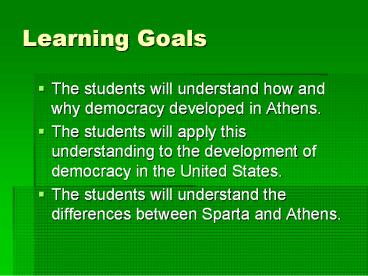Learning Goals
1 / 12
Title:
Learning Goals
Description:
Learning Goals The students will understand how and why democracy developed in Athens. The students will apply this understanding to the development of democracy in ... –
Number of Views:69
Avg rating:3.0/5.0
Title: Learning Goals
1
Learning Goals
- The students will understand how and why
democracy developed in Athens. - The students will apply this understanding to the
development of democracy in the United States. - The students will understand the differences
between Sparta and Athens.
2
AthensThe Birth of Democracy
Power is given to a representative group of
People (Senate/Congress)
Power lies directly in the hands of the people
- By Mr. Fitzpatrick
Monarchy
Democracy
Democracy
Oligarchy
Oligarchy
3
This is ATHENS
Reforms of Solon
The First Constitution
- Limited amount of land a person could own
- All landowners could now vote
- Only the ASSEMBLY could make laws
- All debts were erased, start from scratch
- People in slavery from debt were freed
- Artisans and craftsmen could become citizens
- All sons had to be taught a trade by their fathers
Encyclopedia Article
4
This is ATHENS
Reforms of Peisitratus
He was a tyrant who got power from the help of
the poorer citizens
- Divided large estates and gave them to farmers
who owned no land - Gave citizenship to all, even if you didnt own
land - Encouraged sculpture and other arts to entertain
people
5
The Story of Athens Early Government
- First, Solon tries to change the Government.
- Cleisthenes is a young rich boy, growing up under
aristocratic rule. - Peisistratus walks into Athens with a tall woman,
claiming she is the goddess Athena. They take
over power. He is a tyrant, but being a tyrant
is not a bad thing. The people like him. Greece
becomes an economic power, trading olive oil all
over the Mediterranean Sea. - When Peisistratus dies, his son Hipias takes
over. - He is good at first, but when his brother is
murdered, he becomes pretty ruthless. - The people no longer like him.
- Cleisthenes is now a grown man. He overthrows
Hipias, and kicks him out of Athens. He goes to
Persia, angry at the Athenians. - Pysagorus wants to take control from Cleisthenes,
so he goes to the Spartans for help. They agree,
and send a force to Athens. - Cleisthenes, and over 700 other aristocrats are
made to leave Athens. - The common Athenians REVOLT against Pysagorus.
They climb the Acropolis, and make him surrender. - WHAT NOW????
- They go get Cleisthenes back, and he creates the
Common Vote of the people, creating a Democracy. - He puts Athens on the path to greatness, but
does not take them there himself. - Pericles.
The Anthenians
6
This is ATHENS
Reforms of Cleisthenes
- Opened the ASSEMBLY to all males over 20
- Gave freedom of speech
- Council of 500 had term limit of 2 years so
everyone could have a turn - At 7 boys had to start schooling reading,
writing, math, and music - Citizenship was granted at 18 if promise to
- 1) make Athens a better place
- 2) be honorable in battle
- 3) follow the constitution
- 4) respect the gods and religion
First Democratic Constitution
7
Review
- Began as a Monarchy a King or Queen
- Led to Oligarchy a few people have the ruling
power - Possible Uprising Things Must Change. Unlike
Sparta, they did not have the strength to put
down a revolt. - Solon developed the first constitution, limited
amount of land ownership per person, freed slaves
of debt, offered artisans citizenship along with
all landowners. - Peisistratus gave non-landowners land, no
longer had to own land to vote, encouraged
sculpture and other arts. Tyrant, who was
supported by the Poor. - Cleisthenes First Democratic Constitution, the
democratic assembly.
8
ATHENIANS
SPARTANS
Interactive Link to this Review
No reading here
Our women train to be fit
Our boys train to be soldiers
No writers here
Our women are not allowed out of the house
We have kings who make our laws
No foreigners here
Our boys go to school
We welcome visitors
We throw out visitors
We like books and free speech
We welcome writers
We dont trade, we allow others to do it
We trade with everyone
Humanities Activity
9
Athens The Truth about Democracy
Forms of Government
Horrible Histories Wife Swap
10
Big Quarterly Question
- In Athens,
- a) we welcome new ideas and accept change.
- b) we value independent women.
- c) we do NOT form alliances with other city
states. - d) we do NOT like to trade with outsiders.
11
Big Quarterly Question
- I, along with my fellow assemblymen, left a
legacy for you, which is a government - represented by the citizens, for the citizens.
12
Big Quarterly Question
- Which of the following are the duties of citizens
in a Greek city state? - Vote Attend school
- Farm Defend the Polis
- Hold public office Respect women
- Educate youth Take part in government































